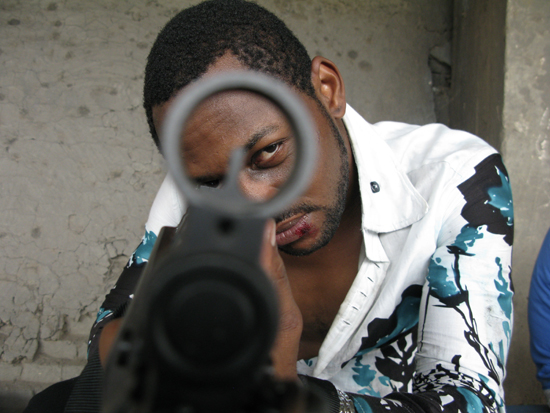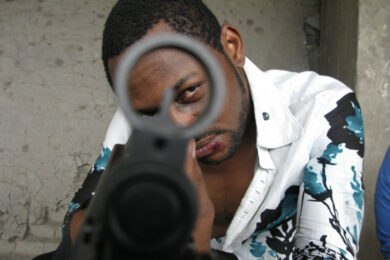It has been years since a note-worthy feature film has came out of the Democratic Republic of Congo, and it is exciting to think that Viva Riva! – a first feature produced by an all African cast and crew – might lead a wave of so called ‘new Congolsese cinema’.
Director Djo Tunda Wa Munga received his filmmaking education in Europe, but is a true Congolose at heart. He skillfully depicts his country’s turbulent existence with a loud and sensual style. Viva Riva! follows the conventions of the neo-noir and thriller genres as it explores the reality of the Congo’s capital, Kinshasa: a city that has suffered much in two civil wars, and now a den of smugglers, gangsters and corruption.
The film follows Riva, an ambitious young petrol thief who returns to his hometown with tons of cash after a ten year residence in Angola. This new found wealth allows him to lead a hedonistic lifestyle, until he falls for Nora, a femme fatale who ‘belongs’ to the most notorious gangster in Kinshasa. Meanwhile his Angolan ex-boss arrives in town seeking revenge: cue a (long) series of action sequences which take us on a relentless game of hide-and-seek punctuated with violence and sex. Along the way, Djo pokes fun at religion and the corrupt social system, but he addresses the political backdrop in a non-judgemental way. There are also very distinctive sounds throughout the film, an interesting mixture of Congolese Rhumba, Ndombolo, Afro-beat and Techno that fill the city’s sinister nights.
The Quietus caught up with the charismatic director on a publicity tour in London earlier this week.
Did you know from an early age that you wanted to be a filmmaker?
Djo Tunda Wa Munga: Not at all. When I went to University in Belgium to study advertising (which, by the way, I didn’t really enjoy), I had no idea I would turn to film. Coincidentally, I went to this film-making workshop where I met a very dynamic teacher. He suggested I try film school. I was not very keen at first, but he insisted that by attending I could end up discovering a lot of things about myself – which I did. Soon after, I applied to a proper film school, I got accepted and my journey as a filmmaker began.
How much has your European education influenced the way you made Viva Riva!?
DTWM: I was born and raised in Africa until I wan nine. My cultural background was mainly influenced by my country and my family. When I went to Europe I was aiming for a professional education, the sort of ‘craftsman’s work’ and culture that you find there and in America – which certainly does not exist in Africa. This is what I miss when I am in Congo. However, drawing from discussions I had with some script consultants (who were all American), I was advised that some issues in my film were not as important as others. But for the constitution of my film they were actually really important. For me elements that derive from my culture are critical, even if they are against the film or ‘the thriller’ as a genre.
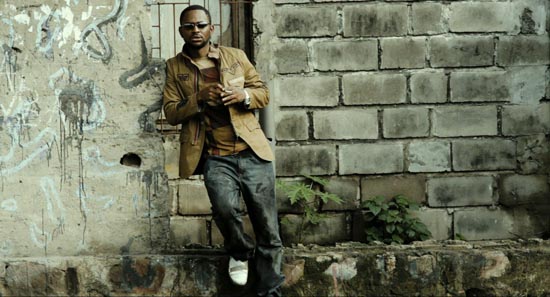
How personal is the making of a film that exposes the flaws of one’s own city?
DTWM: I had two contradictory feelings when making this film. By criticising my own country and environment I initially feared that people could turn against it and accuse me of making a film for westerners, or the type of film westerners would make – which is not the case. On the other hand, I hoped that people would support the film, considering that this is the first one coming out of our industry since 26 years (also in our native Lingala language). Of course I knew there is a tradition we ought to respect. Even if the result is fictitious entertainment, the way it is depicted is close to a certain reality. For me it was about having the base of something real and from there building a story. I was not interested in fairy-tale imagery. What’s the point?
That said, the film’s cinematography and colours add a magical quality to it. The image we get from Kinshasa is of a sexy, rough and vibrant place with a particular nocturnal eroticism.
DTWM: I don’t think this element was conscious from my part. It is interesting that some people have perceived Viva Riva! as a dark fairy-tale. Regarding the cinematography, I suppose the style derives from my personal aesthetic on colours and on how I envisioned the image to be from the beginning.
Were you tempted to visually romanticise Kinshasa, or is it what we see the real deal?
DTWM: It is interesting that you mention that. Two weeks ago I was in New York and I went to see Alexander McQueen’s exhibition. I found it incredible. I completely forgot how much I enjoyed romanticism, that is, when I was young, studying Fine Art. With Viva Riva! I wanted to share with the audience the feeling I have for this city; document its density and vibrant nightlife. But it was difficult to find the right story that would get me to that. I did not want to show characters that are just going dancing. Thankfully, when I went to South West Congo, I met real smugglers and by speaking to them I found out how they operate and make money. This inspired me to write this story.
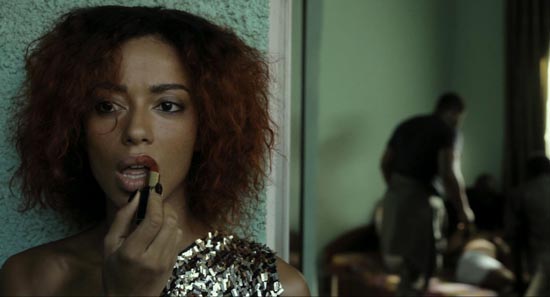
Crime, corruption and hypocritical devoutness are addressed with irony and humour in the film. Was this a safe way to tackle these subject matters?
DTWM: The reason why I chose to do a genre film – in this case a thriller – is because there are certain codes you have to follow. It is easier for the audience to get into the vehicle: you drive and along the way they can recognise the good guy, the bad guy, the money, the women, all that. From that point, I wanted to add some more complex issues. For example, the scene when Riva waits for Nora outside the mansion is normal for the way houses are built in Kinshasa, with bars at the windows. So Riva can’t really sing a song or do much there, but the passion is alive. Essentially, it is just two people who have a strong desire for one another, trying to find a way to make it happen. My point of view was to show how people interact within the city’s limitations; how they fantasize about love, offering themselves to each other like gifts. As for the humoristic part – I think with thrillers you must keep a certain distance from reality. The tensions occurring in the film require moments of relief. It is also the way I see things as well, because for me, a priest for example is a priest but a human being too…
There is an abundance of sex scenes in the film. What where the challenges during shooting?
DTWM: It was not easy to shoot them. We had to talk about it in advance with the actors. The way I approached them relates more to my personal environment and influences. When I think about the kind of fantasies I have about Kinshasa, there is a lot of eroticism there: in the music, the dance, the people, the way we relate to each other… It is a very erotic city and for me it was difficult to exclude this element. When you look at the majority of African films, there are hardly any sex scenes – as if sexuality is not part of people’s lives. Somewhere, at some point, the characters will switch the light off and that’s it. The idea of this film was to place the camera where people don’t usually go, and explore.
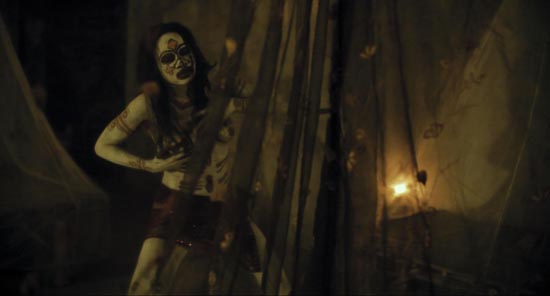
How did people in Congo respond to the film?
DTWM: We did some test screenings in Kinshasa (as the film opens in September there), which were positively received. I thought that the nude scenes would create problems, as well as the poking [fun at] faith or the raw depiction of violence. However, there wasn’t any extreme reaction. People have matured. When they see a film like this, they experience a catharsis; seeing what has been an organic part of their life, when depicted on screen.
Music has an integral part in the film. Did you compose for the films prior to the shooting?
DTWM: Yes. There were designed ahead of the film, but it took a long time to find a balance and to make exactly what I dreamed of. Talking about Kinshasa without talking about the music doesn’t make any sense. For me, music was very important. We spent a lot of time gathering material and I wanted to make a proper soundtrack that fits the film and also achieves a balance. I constructed four parts of music about the city: first it was the traditional music that plays at open air festivities: the songs used in the outdoor gatherings (when Riva meets Nora) are the essence of Congolese music, infused with a certain dance and atmosphere. After that we move to what is known as the first modern Congolese music, the Rhumba, following Franco’s massive influence. Then we jump into the contemporary music that plays in clubs – that is what you will hear in Congo and the rest of Africa at the moment. Finally, for the fourth part, I attempted to envision the future in music, foreseeing an evolution into a type of fusion. I had this great young singer called Papy Mbavu (who had a huge hit few years ago with a song called ‘Kotazo’). Mbavu is really someone from the streets, very authentic; his lyrics resemble a way of speaking, and his voice has an interesting rage. I worked with him, a DJ from Sweden and other musicians to create this techno-Congolese fusion.
You changed quite a few editors during post-production…
DTWM: Four! I’ve learned that even if you write a script and you have a clear vision of what you want and how to shoot it, it’s not enough. It is not like putting everything together and the film is going to be there. I tried three different editors and I still couldn’t find my film. My last editor, Yves Langlois, was incredible. I did not give him the script; he just watched the rushes, chose the shots and started building the film. At that moment I met the film I wrote.
Viva Riva! paves the way for a ‘new Congolese cinema’. Are you anticipating the flourishing of an industry equivalent to Nollywood?
DTWM: You mean ‘a new Congolese experience’… Gosh, the pressure is high! From my side, it all started four years ago with a training programme I developed, where directors, actors and crew received professional training. Then I produced a documentary series called Congo in Four Acts that screened in Berlin last year. The next step is to get involved with more productions of feature films, hoping that new directors will join. From there we will see how it goes – maybe it is the beginning of something, I hope.
Finally, how is life in Kinshasa for a young filmmaker?
DTWM: Very exciting. There is [much] stuff going on, lots of story-telling waiting to be told – you are always challenged by life there. Even if there is corruption, I am inspired by the stories around my city and I want to write more.

